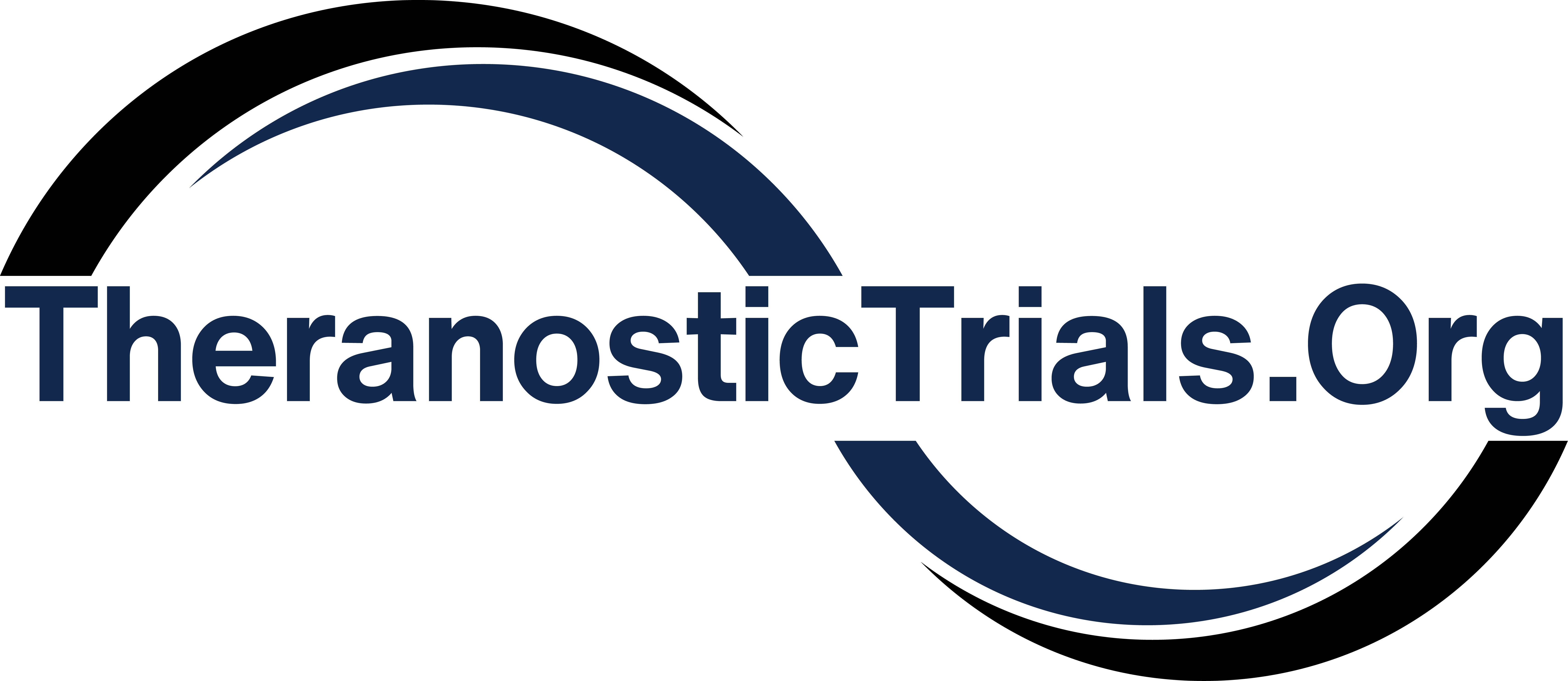Filters
(20 results)
Study Types
Enrolling Status
Study Sponsor Type
Melanoma/Skin Cancers
Study Status
Last Updated: Tue Jul 15 2025
Pharmaceutical Trials (Site Sponsors)
🇦🇺
🇺🇸
🇨🇦

Treatment Metastatic Cancer
Ac225 FPI-1434 in Breast, Cervical, Uterine, Ovarian, Melanoma, & Head/Neck Cancers

Treatment Undefined Stage
A Phase 1 SAD/MAD dose escalation and expansion study to determine the safety and effectiveness of ²¹²Pb-DOTAM-GRPR1 in subjects with various GRPR-expressing Tumors
🇨🇦
🇺🇸

Treatment Undefined Stage
Dosimetry trial of Lu177-PNT6555 in selected Solid Tumors
Pharmaceutical & Investigator Trials (Non-Site Sponsors)
NCT04169321
First in Human Safety of [68Ga]-NOTA-hGZP- PET Imaging in Subjects Receiving Checkpoint Inhibitor Immunotherapy
First in Human Safety of [68Ga]-NOTA-hGZP PET Imaging in subjects with cancer undergoing treatment with a checkpoint inhibitor either as a monotherapy of in combination I-O therapy
NCT04272658
Interest in PET/CT Whole-body Dynamic Acquisition at FDG to Differentiate Progression/Pseudo Progression of Metastatic Melanoma Under Immunotherapy
The value of 4D body-to-whole dynamic acquisition in FDG PET / CT to differentiate progression / pseudo-progression during the first therapeutic assessment (PET1) of metastatic melanoma treated with immune checkpoint inhibitors (ICI)to predict the progression of the disease.
NCT05068102
An Open Label Phase I PET Imaging Study to Investigate the Bio-distribution and Tumor Uptake of [89Zr]Zr-BI 765063 and [89Zr]Zr-BI 770371 in Patients With Head and Neck Squamous Cell Carcinoma, Non-small Cell Lung Cancer or Melanoma Who Are Treated With Ezabenlimab
The purpose of this study is to find out how 2 medicines called BI 765063 and BI 770371 are taken up in the tumours and how they get distributed in the body. In addition to BI 765063 or BI 770371, participants also receive ezabenlimab. BI 765063, BI 770371 and ezabenlimab are antibodies that may help the immune system fight cancer. Such therapies are also called immune checkpoint inhibitors. Participants get either BI 765063 or BI 770371 in combination with ezabenlimab as an infusion into a vein every 3 weeks. In the first weeks, doctors check how BI 765063 and BI 770371 are taken up in tumours. To do so, the doctors use imaging methods (PET/CT scans). For this, participants get BI 765063 or BI 770371 injected in a labelled form up to 2 times.
🇺🇸
NCT05130255
GD2-SADA:177Lu-DOTA Complex in Patients With Solid Tumors Known to Express GD2
Patients will be treated with GD2-SADA and 177Lu-DOTA to study the safety and how well participants tolerate the treatment.
NCT05289193
CD8+ Cell Imaging During Neoadjuvant ImmunoTherapy (The C-IT Neo Trial)
Combination treatment with nivolumab and ipilimumab before surgery may help people with melanoma because the drugs are designed to help the immune system target and destroy cancer cells (immunotherapy), which may shrink the cancer and prevent recurrence after surgery. Treatment given before surgery is called neoadjuvant therapy. The purpose of this study is to find out whether neoadjuvant therapy with nivolumab and ipilimumab can kill melanoma tumors before surgery and prevent disease from coming back after surgery. This study also explores a new, experimental PET scan that images the immune system to see if it is related to treatment outcomes.
NCT05496686
First in Human Phase I Study of 225Actinium-MTI-201 (225Ac-MTI-201) in Metastatic Uveal Melanoma
The primary aim of the study is to establish the maximum-tolerated dose (MTD) of 225Ac-MTI-201 in participants with metastatic uveal melanoma. The secondary aims are to describe the pharmacokinetics of 225Ac-MTI-201 and the toxic effects of 225Ac-MTI-201 in participants with metastatic uveal melanoma.
NCT05655312
Phase I/IIa First-in-Human Study of [212Pb]VMT01 Targeted Alpha-Particle Therapy for MC1R Positive Advanced Malignant Melanoma Dose
In this first-in human, phase I/IIa study, the safety and efficacy of [212Pb]VMT01, an alpha-particle emitting therapeutic agent targeted to melanocortin sub-type 1 receptor (MC1R) is being evaluated in patients with unresectable and metastatic melanoma.
NCT06199713
Correlation Between Early Interval 18F-Fluorodeoxyglucose Positron Emission Tomography/Computed Tomography (PET/CT) and Circulating Tumor DNA (ctDNA) in Advanced Melanoma Patients Treated With Immune Checkpoint Inhibitors
The purpose of this research study is to determine if analysis of PET/CT scans and testing of blood samples in people with melanoma that has spread in their body can help researchers determine which patients are more or less likely to respond to immunotherapy and are more or less likely to have side effects. 24 participants will be enrolled and be on study until approximately 4 weeks after their first dose of Immune Checkpoint Inhibitor therapy.
NCT06939036
A Multicentre, Open-label, Phase I/II Study Investigating the Safety, Tolerability, and Preliminary Efficacy of 225Ac-SSO110 in Participants With Extensive Stage Small Cell Lung Cancer (ES-SCLC) or Merkel Cell Carcinoma (MCC) Receiving Standard of Care (SoC)
This study aims to determine safety, tolerability, recommended phase 2 dose (RP2D), and preliminary antitumor activity of 225Ac-SSO110 with standard of care (SoC) therapy in patients with somatostatin receptor 2 expressing (SSTR2+) extensive-stage small cell lung cancer (ES-SCLC) and recurrent locally advanced or metastatic Merkel cell carcinoma (MCC).
NCT02936388
A Randomized Phase II Trial of Transarterial Radioembolisation With Yttrium-90 (SIRT) in Comparison to Transarterial Chemoembolisation With Cisplatin (TACE) in Patients With Liver Metastases From Uveal Melanoma
Characterisation of effect of SIRT and DSM-TACE as local treatment options for liver metastases in patients with advanced uveal melanoma with respect to progression-free survival and exploratory comparison of secondary endpoints regarding application, activity, adverse effects and impact on quality of life in a randomized study design.
NCT03584334
Prospective non-randomized, multi-center, diagnostic performance study of 18FDG PET for identification of early tumor escape to immunotherapy in patients with unresectable melanoma or Broncho-Pulmonary Carcinoma No to Advanced or Metastatic Small Cells
The hypothesis of this diagnostic performance study is that, for patients treated for immunotherapy-treated melanoma or NSCLC, some metabolic parameters of the 18FDG dual-point PET scan distinguish inflammatory pseudo-progression from tumor progression true and thus improve the evaluation of tumor response to immunotherapy
NCT03784625
Targeted Radionuclide Therapy for Metastatic Melanoma [131I] ICF01012: Phase I Study
This study is a phase I clinical trial aimed to determine the recommended dose of [131I]ICF01012 to administer for the treatment of patients with pigmented metastatic melanoma (binding [131I]ICF01012 ). The [131I]ICF01012 is a targeted radionuclide therapy with a high affinity for melanin.
NCT04663126
Pilot Study to Test the Feasibility of IV Injected Tc-99m-tilmanocept for Imaging of M2-like Tumour Associated Macrophages in Metastatic Melanoma
This study in 20 patients is designed as a monocentric, open-label and uncontrolled, exploratory pilot study. Patients diagnosed with advanced melanoma (stage III-IV) and scheduled for anti-PD-1 immunotherapy will be recruited for this project. Patients will receive IV 250 µg Tilmanocept, labelled with 370 MBq of Tc-99m (bolus injection) according to the Navidea's protocol in our GMP certified radiopharmaceutical unit, before the first cycle of clinically scheduled immunotherapy. Scintigraphy images will be acquired dynamically from time of injection to +30 minutes. Quantitative SPECT/CT (xSPECT/CT, Siemens Symbia Intevo, Erlangen, Germany) imaging will be performed up to 1 hour p.i. to evaluate hyperaemia, and up to 3 hours p.i. to image and measure the CD206 receptor uptake. The data of the scans will be compared to immunohistochemistry results from biopsy staining for TAMs and M2-like TAMs and retrospectively with response to the immunotherapy to determine any correlation between M2-like TAMs and treatment response. For the planned retrospective comparison we will use the FDG - PET/CT data that is done after the immunotherapy as standard of care. We will analyse the lesion size and FDG - uptake in standard of care PET/CT of CD206+ and CD206 negative lesions in Tilmanocept SPECT/CT before and after immunotherapy to determine any correlation between CD206 related uptake and treatment response.
NCT05000372
68Ga-grazytracer PET/CT of Tumor Responses to Immunotherapy in Subjects With Non-small Cell Lung Cancer or Melanoma
This is an open-label positron emission tomography/computed tomography (PET/CT) study to investigate the clinical predictive value of 68Ga-grazytracer in subjects with non-small cell lung cancer or melanoma receiving immune checkpoint inhibitors (e.g., Ipilimumab, Nivolumab). A single dose of 2.96 MBq/kg body weight of 68Ga-grazytracer will be injected intravenously. The visual and semiquantitative methods will be used to assess the PET/CT images.
NCT05744128
Positron Emission Tomography Repeatability Evaluation of Tissue Zirconium 89Zr Crefmirlimab Berdoxam
Zr-89 crefmirlimab berdoxam is a Zirconium-89 labelled minibody developed by ImaginAb for full body PET imaging of CD8+ cell distribution (CD8 ImmunoPET). The primary objective of this study is to assess the test-retest repeatability of CD8 immunoPET imaging in oncology patients with stable disease.
NCT05645484
The Prognostic Value of 18F-PFPN PET Imaging in Patients With Malignant Melanoma
This is a monocentric prospective study. This study aims to investigate the prognostic value of the novel melanin-targeted imaging modality 18F-PFPN PET in patients with melanoma and seek independent prognostic factors for progression-free survival (PFS) and overall survival (OS). The patients with clinically highly suspected or confirmed melanoma who underwent 18F-PFPN and 18F-FDG PET scans will be enrolled consecutively. Patients' PET images, clinical characteristics, and follow-up information will be collected for prognostic analyses. This study plans to set the sample size as 100 cases.




